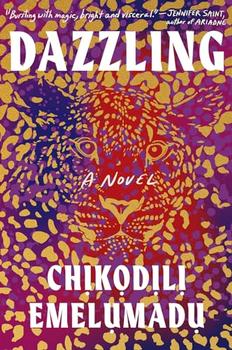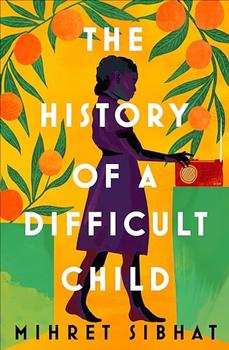Summary | Excerpt | Reviews | Beyond the book | Read-Alikes | Genres & Themes | Author Bio

Adolescence is a time when social positioning takes on a certain weight, when exam grades and friend groups and popularity can begin to make a difference in a person's adult future. Chikodili Emelumadu's Dazzling paints a dramatic picture of this fraught period, specifically for girls in a society that undervalues them, through two teenagers coming of age in 1990s Nigeria: Ozoemena, who has inherited the ability to transform into a leopard from her deceased uncle Odiogo but has yet to make use of this gift, and Treasure, whose grief over her father's death leads her into a dangerous agreement with a spirit who appears to her in human form.
The main action flows around Ozoemena and her entry into a boarding school, where she deals with typical problems — bullies, academic pressure, the perils of not fitting in — along with unanswered questions about her destiny that are tied up with her leopard identity and the milestones she must pass if she is to assume it. The story is notably and refreshingly free of any lingering on her experience as either a persecuted or special figure. Yes, she is markedly different from her peers and must contend with responsibilities beyond her years, but Emelumadu seems more interested in showing how Ozoemena deals with the ethical and practical dilemmas that befall her than in creating a relatable depiction of teenage angst. Luckily, this doesn't keep the book from entertaining mightily in its rendering of classroom and schoolyard taunts between Ozoemena's friends and enemies. "If you talk to me like that I will Jackie Chan your whole face," says one girl. "Can't you take that gum out of your mouth, for god's sake?" says another. "You look like a masticating goat."
The alternating storyline belonging to Treasure, called Dazzling by her father, is similarly full of snark and vigor. While Ozoemena's chapters run on smoothly gliding third-person action and description, Treasure's are characterized by her charming and morally ambiguous first-person narration. When she agrees to procure "wives" for the spirit who promises to bring her father back to her in return, it is easy for the reader to continue sympathizing with her, because she is obviously in deep pain over her father's death and is suffering, along with her mother, from being female in a society that makes it difficult for women and girls to survive without the protection of a man. Besides, she's funny, and resourceful, and the people she does bad things to sometimes seem to almost deserve it.
It isn't clear until close to the end how the two storylines will intersect, or rather, have already intersected. In the meantime, they vacillate not only between perspective but also time. This format is handled impressively, sustaining interest and suspense despite the reader's lack of knowledge about what exactly is going on. Emelumadu achieves this in part through the episodic nature of the chapters, which read as an end in themselves, a feature that compensates somewhat for the book's ending, which feels abrupt and out of step with the emotional and ethical nuances of what comes before.
Despite this disappointment, Dazzling is memorable in its portrayal of the persistence of grief, and it excels in showing what is sacrificed when people become mired in the past. Treasure, embodying her names, exudes a vitality unappreciated by those around her even as she makes rash decisions that risk her future. Both characters are, in one way or another, moving towards or preoccupied with death, yet moment by moment, Emelumadu's novel is an honoring of life — not intellectually or explicitly, but simply in the way that good fiction creates a vivid sense of existence that makes the world a little brighter, if only for a short time.
![]() This review
first ran in the January 24, 2024
issue of BookBrowse Recommends.
This review
first ran in the January 24, 2024
issue of BookBrowse Recommends.

If you liked Dazzling, try these:

The History of a Difficult Child
by Mihret Sibhat
Published 2024
A breathtaking, tragicomic debut novel about the indomitable child of a scorned, formerly land-owning family who must grow up in the wake of Ethiopia's socialist revolution

by Nana Nkweti
Published 2021
A "boisterous and high-spirited debut" (Kirkus starred review), named one of the Most Anticipated Books for Brittle Paper, The Millions, and The Rumpus, penned by a finalist for the AKO Caine Prize.
Your guide toexceptional books
BookBrowse seeks out and recommends the best in contemporary fiction and nonfiction—books that not only engage and entertain but also deepen our understanding of ourselves and the world around us.